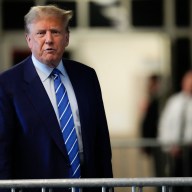By Noah Barkin and Yara Bayoumy
DAVOS, Switzerland (Reuters) – Donald Trump flew into the sanctum of the global elite on Thursday to promote his tax cuts and deregulation policies to CEOs and bankers, many of whom are eager to invest in the United States despite reservations about his turbulent presidency.
The first sitting U.S. president to visit the World Economic Forum in Davos since Bill Clinton in 2000, Trump helicoptered into the Swiss ski resort and was greeted by hundreds of curious delegates who snapped pictures as he entered the congress center.
After meeting the prime ministers of Britain and Israel, Trump hosted a dinner with leaders of some of the world’s largest corporations, including Nestle, SAP and Siemens, Deloitte and Bayer. Senior members of his cabinet were also present.
“A lot of people are coming back to the United States. We are seeing tremendous investment and today has been a very exciting day. Very great day and great for our country. Thank you very much,” Trump told reporters in Davos.
Trump, a real estate mogul and former reality TV star, had never been invited to Davos before. He basked in the praise of several executives, who applauded his tax cuts.
Two European executives told Reuters they were staying away from the dinner because they did not want to shake Trump’s hand. One of them consulted with his wife and children before deciding to dine elsewhere.
Those that showed up were treated to a meal of grilled beef tenderloin with green pea puree or fried Swiss pike perch with purple carrot puree.
Trump gave each corporate leader an opportunity to describe their businesses briefly. Many mentioned the corporate tax cuts that Trump pushed through the U.S. Congress late last year as a positive sign of growth and investment, according to a Reuters reporter who was present.
Trump is due to address the forum on Friday and White House aides said his message would be the same that he has given during other trips abroad over the past year: The United States wants strong ties with its allies but is also determined to reduce its chronic trade deficits with many of them.
His speech comes after a week of warnings by European leaders on the dangers of nationalism, isolationism and protectionism.
Without naming Trump, German Chancellor Angela Merkel evoked the build-up to the two world wars and openly questioned whether leaders had learned the lessons from those 20th century conflicts.
Before his trip to Davos, Trump imposed 30 percent tariffs on imported solar panels, among the first unilateral trade restrictions made by the administration as part of a broader protectionist agenda.
On Wednesday in Davos, U.S. Treasury Secretary Steven Mnuchin made comments supportive of a weaker dollar. Markets interpreted the remarks as a shift in U.S. policy and sent the dollar sharply lower, sparking concerns from European allies about a trade war.
European Central Bank chief Mario Draghi took a swipe at Mnuchin’s remarks, saying they threatened a decades-old pact between the world’s leading economies not to target currencies.
Trump later told CNBC in an interview that he supported a strong dollar and expected the currency to rise.
Trump’s decision to come to Davos came as a surprise because he has railed against “globalists” and elites, while promoting an “America First” agenda that goes down poorly in this bastion of free trade, multilateralism and capitalism.
French President Emmanuel Macron said he had “strongly recommended” that Trump attend the forum during a recent phone conversation, saying he thought it was a good thing for Trump to explain his strategic goals and hear different viewpoints.
There is broad concern in European capitals that 2018 could be the year Trump’s bark on trade turns into bite, as he considers punitive measures on steel and threatens to end the 90s-era North American Free Trade Agreement with Canada and Mexico.
Policymakers have been openly critical of his foreign policy but with the U.S. stock market soaring, corporate tax cuts padding companies’ pockets and U.S. consumers spending again, some companies here are quietly applauding the U.S. president.
(Additional reporting by Steve Holland and Silvia Aloisi; Writing by Noah Barkin and Yara Bayoumy; editing by Grant McCool and Mark Bendeich)

















